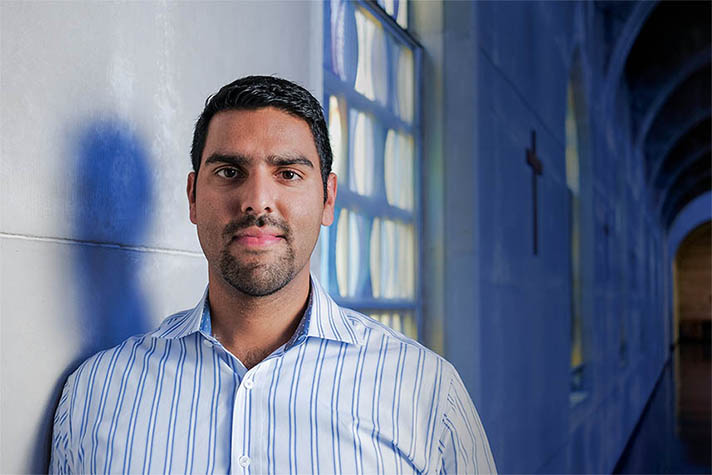
On a Sunday afternoon a young man stood amid the throng of listeners in Speaker’s Corner, a section of London’s Hyde Park that facilitates open-platform discussions and monologues.
He was captivated by the message of a Christian—Nabeel Qureshi—a speaker for Ravi Zacharias International Ministries and author of Answering Jihad: A Better Way Forward.
Qureshi began to dialogue with the man in Hyde Park, who was raised in a Pentecostal home, but had converted to Islam after being drawn by its sense of community and teachings. He would later go to Saudi Arabia, where he spent four years in higher Islamic education.
After immersing himself in his Islamic faith, he began to see inter-Muslim violence and young men being asked to kill themselves in the name of Allah. Once he returned to England, he was asked by a fellow Muslim to participate in a suicide-bombing mission.
“He decided he would have no more of this. He asked God to reveal Himself and Jesus appeared to him in a dream,” said Qureshi of his new friend, who left Islam and now follows Christ.
The man from Hyde Park has a happy ending to his story, but there are many other young Westerners who are drawn to the Muslim community and its practices—and some even begin a path toward radicalization.
“The Muslim community happens to be tightly knit,” Qureshi explained. “They look after each other quite well. And there are a lot of conversions that happen in the West. When someone converts to Islam, they tend to not be culturally Muslim.
“They tend to pursue the teachings of Islam wholeheartedly. They want to be ‘good Muslims’ because they fall in love with their newfound faith, so they start studying the Quran and traditions of Muhammad’s life. When they start doing that, we have to be concerned that they are on the verge of radicalization. They reach a three-pronged fork: they either become a nominal Muslim, an apostate or radicalized. And many converts are faced with the latter.”
Last summer, the New York Times published an article titled, “ISIS and the Lonely Young American,” which chronicled a 23-year-old woman’s journey from Christianity to Islam.
The woman, with the pseudonym “Alex,” began searching social media platforms to learn more about ISIS after news broke of journalist James Foley’s beheading. What started out as morbid curiosity led to conversations with radicalized Muslims who identified themselves with the Islamic State.
Once the radicals realized she was sincere in her curiosity, they invited Alex into their virtual community. Soon, one of her new friends began to convince her that Jesus was a prophet, but he was not God.
Concerned, she visited a pastor to ask him if believing in the Trinity meant that Christians were polytheists. But the pastor was unprepared to give a solid, biblical answer. Within 15 minutes, Alex left the church building—with even more questions. Some time later, she posted a declaration of her new Muslim faith on Twitter.
Answers and Love
Stories like this, said Qureshi, are common. While he came to Christ through years of discussions with a friend, his pre-conversion experience with the church was similar to Alex’s.
“As a Muslim—especially one in the West—I had been trained to discredit the Gospel,” he said. “With these basic arguments I had memorized as a child, I was able to confuse pastors, who didn’t have the answers ready. This is going to be the challenge of the next century. We need to be set up to receive our Muslim neighbors.”
While the church should be ready to face radical Islam with answers, we should also be ready to meet our Muslim neighbors with love.
Afshin Ziafat, pastor of Providence Church in Frisco, Texas, is an Iranian-American raised in a Muslim home. When he was 6 years old, his family moved from their native country to Houston during the Iran hostage crisis.
“It was not cool to be from Iran living in America,” recalled Ziafat. “There were rocks thrown in our windows, people slashed our tires, and my brother and I were threatened by some older teenagers.”
Thankfully, not everyone in Houston treated the Ziafats with contempt.
“One Christian lady—a tutor at my elementary school—looked at my family and didn’t see a threat. She saw an opportunity,” he said. “She taught me English, and she poured herself into me. She handed me a New Testament and said, ‘This is the most important book you’ll ever get.’ I held on to it for years because she gave it to me. If any other American had given it to me, I would have thrown it into the trash can.”
Ten years later, as a senior in high school, Ziafat dusted off the gift from his tutor, read it and gave his life to Christ.
“Scripture says to look after the sojourner and foreigner among us … Jesus said, ‘When I was a stranger, you welcomed me’ (Matthew 25:35). Especially at a time when Muslims in our neighborhoods are expecting us to ostracize them—when they are expecting you to hate them, and you love them, they’re going to be blown away,” said Ziafat.
©2016 BGEA
